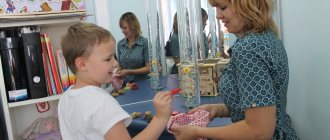There are many interesting and in-demand areas in the field of pedagogy. This list also includes the profession of defectologist, which is represented by a number of specializations. Such employees work with children of different ages, helping them get rid of physical and mental disabilities. Their activities are closely related to medicine, but do not require obtaining a medical degree. To work according to your profile, it is not enough to graduate from a specialized university. You need to find and develop a number of personal qualities, without which the employee’s effectiveness will be minimal.
Who is a defectologist and what does he do?
Expert opinion
Ekaterina Kolokolova
Career guidance. Certified specialist in the problems of children's involvement in learning.
A defectologist is a specialist in the field of defectology (a special area of special or correctional pedagogy). He studies the patterns of development of children with mental and physical disabilities, their upbringing and education. Such workers help children adapt to society and prepare for school.
Depending on the type of problems being solved, a defectologist may have one of the following specializations (or several):
- speech therapist - deals with the correction of speech disorders;
- teacher of the deaf (diplopedagogist) - helps solve problems associated with impaired hearing function;
- Amblyologist (typhlopedagogue) - works with children with vision pathologies;
- orthopedic teacher - specializes in diseases of the musculoskeletal system, patients with cerebral palsy, postural disorders;
- oligophrenopedagogist - provides assistance to children with a reduced level of intelligence.
A defectologist is a specialist who helps children with mental and physical disabilities adapt to society.
A defectologist can be a practitioner or a theorist. The first (correctional) work directly with children, trying to solve specific problems. The latter are engaged in science, studying the intricacies of the field, developing methods for teaching and raising problem children.
Features of the profession of defectologist
The division of defectologists by specialization is arbitrary. Most often, employees of this type work with all types of problems listed. They are often found in children in different combinations, so a representative of the profession must navigate in all directions.
In their work, defectologists work closely with child psychologists, neurologists, and neuropsychologists. It must be understood that such an employee does not treat the disease that caused its characteristic symptoms. He only makes corrections, acting within the framework of his competence.
Standard list of responsibilities of a defectologist:
- examination of the client, assessment of his level of development, severity of the problem, general condition;
- selection of a work plan with the child depending on the specifics of the situation, drawing up an individual program;
- maintaining documentation to monitor the effectiveness of the correction;
- implementation of activities according to the selected plan, regular assessment of results, making changes to the program;
- interaction with the client’s parents or guardians, advising them on issues of homework with the child;
- studying the interests and hobbies of wards, selecting activities that contribute to their overall development;
- assistance to children and parents in choosing an educational or educational institution, future profession, and leisure options.
Defectologists work with children and their parents and provide consultations. They constantly improve their skills, learning new methods of interacting with clients and ways to help. For this purpose, professionals attend seminars, conferences, and specialized courses.
Important personal qualities of a defectologist
The specialty of a defectologist should be considered only by those people who consider working with children their calling. They must have limitless patience, because it is much more difficult to interact with problem children than with ordinary ones. A profession applicant must have a love for children, a sense of responsibility, goodwill, and creativity. Also, communication skills, leadership skills, rigor, and attentiveness will help them in their work.
Another mandatory quality for a defectologist is the ability to distinguish between personal life and professional activities. A large number of children with illnesses or problems pass through such an employee. If, instead of providing professional help, he begins to empathize with everyone, nervous breakdowns, depression, and other psycho-emotional problems are inevitable.
A defectologist must love and understand children, otherwise he will not be able to work in this area; his main task is to develop in the child skills that will help him in the future find his place in society and adapt.
Professional knowledge
It is impossible to become a defectologist simply by reading specialized literature. To become such a specialist you need to learn from professionals. Training involves mastering methods and techniques for interacting with children and parents of sick children. It also includes the study of correctional pedagogical techniques, the number of which amounts to dozens, and methods for diagnosing problems.
A defectologist needs basic medical knowledge, as well as deep knowledge in psychology, sociology, and conflictology. Such an employee must be able to analyze the conclusions of doctors, teachers and psychologists, as well as read the results of analyzes, examinations, and tests.
Requirements for a defectologist
To work as a defectologist, you need to obtain a higher pedagogical education in your field. You can also get a specialized secondary medical education in the field of General Medicine, after which you can undergo retraining as a defectologist. Typically, qualified employees who have worked for at least 3 years under the guidance of experts in this field are allowed to work directly with children.
Example of a job description
Example instructions (page 2)
Example instructions (page 3)
Example instructions (page 4)
Example instructions (page 5)
Example instructions (page 6)
Pros and cons of the profession of defectologist
People who consider working with children their calling sometimes do not even consider its pros and cons. They are still worth studying in order to enhance the effect of the positive aspects and smooth out the negative ones.
The pros and cons of the direction include:
- the opportunity to provide assistance to children, improving their quality of life;
- availability of career prospects;
- obtaining knowledge during the learning process that can be useful in everyday life;
- the opportunity to directly help children and engage in science at the same time;
- the demand for experts, which gradually leads to an increase in their income;
- a full social package, which often includes shorter working hours and extended vacation periods;
- the opportunity to conduct a private practice, earning good money, and at the same time doing everything legally.
- You need to prepare yourself mentally and emotionally for work and develop resistance to stress.
- Dealing with problem children can be exhausting, and some cases can shock even experienced experts.
- Sometimes classes with children do not produce results, which makes the defectologist doubt his professionalism.
- The salaries of employees without experience, especially in budget institutions, are often below average.
Professional knowledge
- Correctional pedagogical techniques, methods and techniques.
- The ability to establish psychological contact with students.
- Ability to analyze the results of a medical examination, conclusions of teachers and psychologists.
- Diagnostic techniques.
- Deep knowledge in the field of psychology and sociology.
- Basic knowledge of medicine.
- The skills and knowledge necessary to develop an individual correction program.
- Knowledge of 1 foreign language (preferably, but not required).
Famous representatives of the profession
Vlasova Tatyana Aleksandrovna
Soviet psychologist and defectologist
Doctor of Psychological Sciences (1972), Professor (1976), Academician of the Academy of Pedagogical Sciences of the USSR (1982)
More details
Azbukin Dmitry Ivanovich
Russian Soviet defectologist, psychoneurologist
Doctor of Pedagogical Sciences, Professor. Honored Scientist of the RSFSR. He wrote a number of works on psychiatry, which deal with many problems of the pathology of the human psyche.
More details
Training to become a defectologist
To easily get a job as a defectologist, you need to have a higher education. It can be obtained strictly in this profile or in one of the related specialties. When entering a university, you usually need high Unified State Exam scores in subjects such as Russian, biology, and social studies. Competition in this area is growing, so some educational institutions will have to take additional entrance tests in biology.
Courses
If a profession applicant already has a higher education in the specialty of psychologist or teacher, he can become a defectologist according to a simplified scheme. To do this, it is enough to undergo professional retraining in courses in the “Defectology” program. Such as “Capital educational and other institutions.
The duration of the courses ranges from 6 to 12 months. Classes are conducted in full-time, part-time or distance learning formats. In the process of studying, students have to take exams, tests, tests. Based on the results of training, the graduate undergoes certification and receives official documents.
Universities
The specialization “Defectology” is taught in most pedagogical universities, as well as in many educational institutions with a humanitarian bias. Training in the profile takes from 4 to 6 years, depending on its form, as well as the specifics of the field. You can study full-time, part-time, part-time and remotely. The leading universities in this area are: Moscow Institute of Psychoanalysis, Moscow State Regional University, Moscow State Pedagogical University, Russian State Social University, Institute of Special Pedagogy and Psychology, Moscow State Humanitarian University named after M.A. Sholokhov, MSGU.
Indications for seeking help from a specialist
You should seek help from a speech therapist-defectologist if your baby has deviations from the norm in physical or mental development, namely:
- Vision problems (visually impaired and blind children).
- Hearing impairment (deaf and hard of hearing).
- Developmental delay (impaired attention, memory, thinking, perception and other cognitive mental functions), MMD (minimal cerebral dysfunction).
- Mental retardation or Down syndrome.
- Autism.
- Cerebral palsy (cerebral palsy), dysfunction of the motor system.
In some cases, with intact intelligence, but with instability of EMU (emotional-volitional sphere) and behavior, the child may also be recommended to work with special education teachers, including a speech pathologist-defectologist, if the child has speech problems.
Defectologist: where can he work?
The main place of work of a defectologist is a specialized school institution. Also, such professionals are needed in medical and children's centers, boarding schools, and specialized sanatoriums. Increasingly, experts in the field of defectology are invited to work in private kindergartens and schools.
Increasingly, defectologists are inclined to conduct private practice. It is enough to open an office to receive visitors to start working on your profile. The difficulties in this case are associated only with finding clients. True, thanks to the development of social networks, today anyone can start advertising their services with minimal investment.
Example resume
Sample resume (page 2)
Defectological specialties
The science of defectology includes several main areas:
- deaf pedagogy – teaching children with both obvious and minor deviations in the functioning of the hearing aid;
- oligophrenopedagogy – teaching the younger generation with mental disabilities;
- Typhlopedagogy – teaching children whose visual apparatus is impaired;
- Speech therapy is the training of children whose developmental indications are within normal limits, but there are speech disorders identified in pronunciation.
Career
The career of a defectologist usually begins with an ordinary position in a specialized budget institution. Usually he is assigned a curator who controls the actions of the newcomer. At this stage, the employee’s salary is 15-20 thousand rubles. After 2-3 years of practice, the employee can begin to independently receive visitors. His earnings increase to 30-45 thousand rubles. Over time, a practitioner can move to a management position with an increase in income to 50-70 thousand rubles.
In private educational and educational institutions, defectologists receive an average of 50 thousand rubles. Such positions are usually filled by experienced representatives of the profession, holders of an academic degree. When running a private practice, professionals of this type earn from 60 thousand rubles per month.
[salary]
Techniques used
Speech pathologists-defectologists use time-tested techniques, including:
- Massage of the speech apparatus.
- Breathing, physical exercises.
- Gymnastics (articulation, finger exercises).
- Phonetic rhythm, logorhythm.
- Su-Jok therapy.
Instruments include: speech, actions, facial expressions, pantomime, gestures.
Physiotherapy, acupuncture, massage treatments, and medicinal treatment organized by specialized doctors are used as an addition to classes.
If necessary, speech correction can be performed for children who do not have concomitant pathologies. They teach articulation, pronunciation of sounds, letters, writing words and sentences. Children have not developed the perseverance and ability to concentrate required for long-term classes; the duration of one lesson is selected individually (within half an hour).
A tangible effect is observed with persistence, patience, mutual efforts on the part of the speech therapist-defectologist and the patient (parents), systematic, thorough training, characterized by a relaxed atmosphere that stimulates effective training.
In the Radio Beacon Health program, a speech therapist-defectologist answers the questions in detail:
to contents ^









